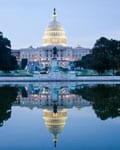Just days before this year’s April 18 tax filing deadline, U.S. Sens. Cory Booker (D-NJ) and Jerry Moran (R-KS) proposed a plan to encourage Americans to build emergency funds. 
Under the bipartisan Refund to Rainy Day Savings Act, tax filers who receive a direct-deposit tax refund would be allowed to defer 20 percent of their refund by opting into the Rainy Day Savings Program on their 1040 tax form.
Refund to Savings (R2S) research at the Center for Social Development (CSD) informed the proposal. The R2S experiment is a collaboration of academic researchers from CSD, Duke University and Intuit Inc., the maker of TurboTax tax preparation software.
“American households’ low rate of savings has placed people at risk of financial insecurity,” said Michal Grinstein-Weiss, associate director of CSD and principal investigator of R2S. “About four in 10 households in the United States do not have enough liquid savings to cover a $2,000 emergency expense,” and that number increases to eight in 10 for lower-income households.
Under the senators’ proposal, tax filers’ savings would accumulate interest in a Treasury-held account then be transferred to the tax filer’s bank account six months later. That way, the program would allow tax filers to save for a “rainy day.”
The bill also would establish a three-year pilot program to evaluate savings matches for lower-income tax filers under existing federal asset building policy, Assets for Independence. Also, the bill would update Assets for Independence by expanding local flexibility for the program to test a variety of matched savings strategies for lower-income workers.
Assets for Independence is based on CSD’s work on Individual Development Accounts in the 1990s, and CSD Director Michael Sherraden advised members of Congress who drafted the first legislation.
“Families living paycheck to paycheck endure the persistent threat of sudden financial disaster,” Sen. Booker said in a press release on April 13. “Without emergency savings, financial stability can easily be jeopardized by an unexpected expense or loss of income, like a medical bill or the sudden loss of a job.”
Sen. Moran said the legislation “would allow Americans to utilize a rare moment of financial flexibility that accompanies a tax refund to plan for the future, set aside savings for a rainy day, and invest in their own financial stability.”
In a blog today for New America, Grinstein-Weiss and Janie Oliphant, CSD project manager for R2S, say tax time can become an opportunity to open doors to greater security. Yet the millions of Americans using free, online tax prep websites do not have the opportunity to open accounts because federal regulation prohibits tax preparation companies to offer products within the tax filing process, they say.
“Policymakers, of course, are just trying to keep households from becoming victim to buying harmful financial products, but by doing so regulators are missing an opportunity to expand tax time’s impact as a catalyst for financial inclusion for lower income households,” they write.
Survey results showed that 30 percent of unbanked households would be interested in opening a new account at tax time, they point out. To learn more, see the April 2016 CSD research brief Characteristics and hardships associated with bank account ownership among Refund to Savings participants.